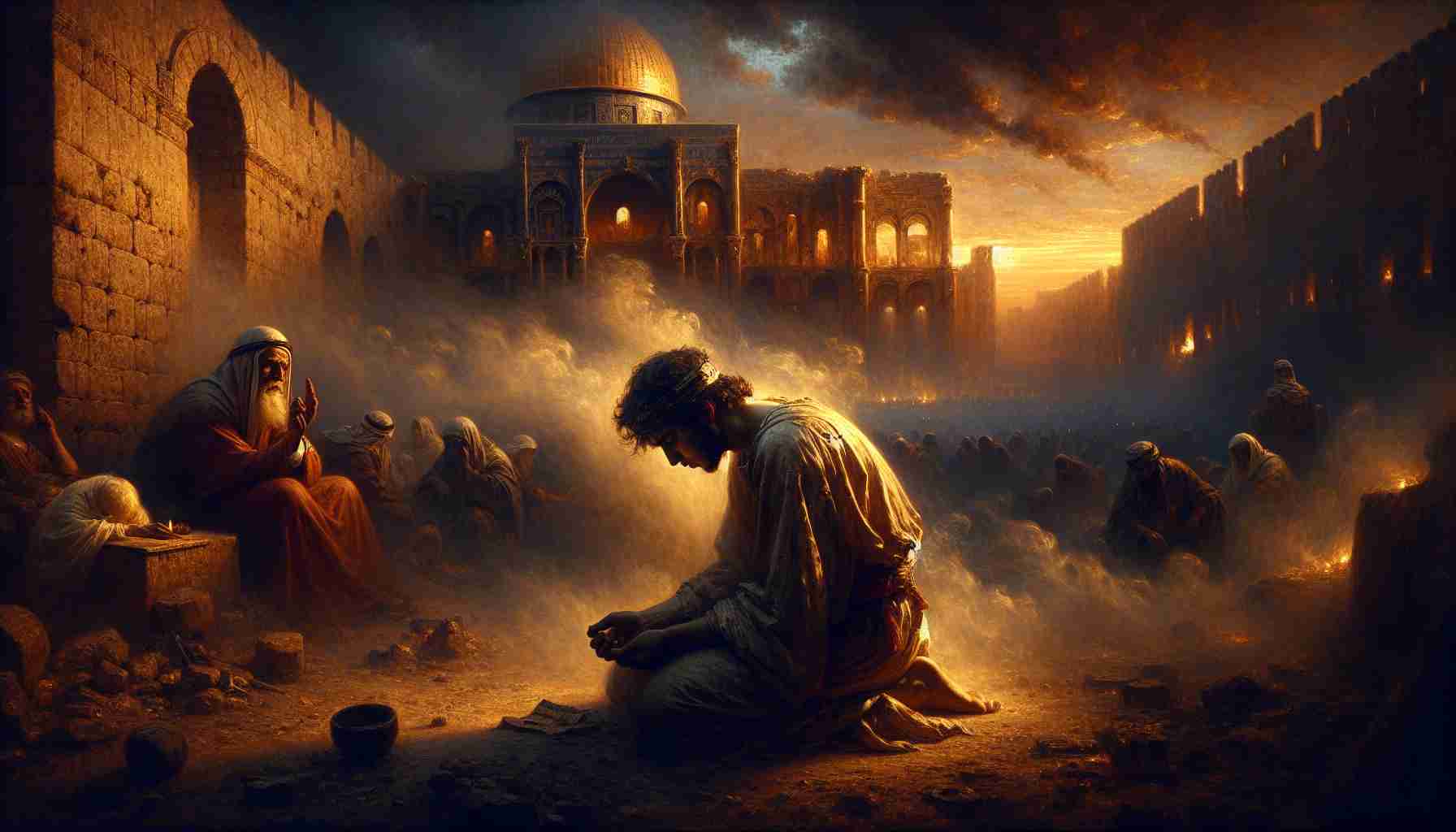

They say prophets walk with angels.
But I was just thirteen when I first saw Yirmiyahu — you may know him as Jeremiah — and he looked more like a young yeshiva student than a messenger of God. I was a boy laborer, hauling water for the priests outside the courtyard of the Beit HaMikdash — the Holy Temple in Yerushalayim (Jerusalem).
That morning, the sky had turned an iron gray, and a heavy stillness blanketed our city. I remember hearing the shuffle of sandals behind me and turning to see him again — not preaching or shouting like some prophets do, but kneeling in the dust, his hands covering his face, shaking with sobs.
I didn’t move.
He stayed like that until a priest walked by and frowned. “That’s Yirmiyahu,” the man whispered to someone behind him. “He sees visions again.”
A few minutes later, I worked up the nerve to bring Yirmiyahu a cup of water. His eyes were red, his lips dry. I handed him the cup.
“Thank you,” he said, softly.
“I’ve seen you here before,” I said. “Why do you cry so much?”
He looked at me. Somehow, even through tears, his gaze felt like arrows of truth. “Because God showed me the burning of Yerushalayim… before it even began.”
I didn’t know what to say.
Later, I heard others say that from the time he was just a boy, Yirmiyahu had heard the voice of the Lord. In the scroll of his words — Yirmiyahu Chapter 1 — it says the Lord told him, “Before I formed you in the womb, I knew you. Before you were born, I made you a prophet to the nations.”
He didn’t want it. None of the true prophets ever begged for the job. But Yirmiyahu obeyed. He warned the people to do teshuvah — to return to God — and stop trusting idols and wicked kings. But they mocked him. Spit at him. Locked him in a pit.
Still, he kept praying. Not just for help — but for us.
I saw it with my own eyes on the day the Babylonians broke through the gates. Fire clawed at the Temple walls. Screams filled the city. And there — amid it all — stood Yirmiyahu. Weeping. Praying.
“Tear your hearts, not your garments,” he cried. “Maybe still — maybe still, He will hear!”
And I believe Hashem — the name we say to speak of God — did hear. Because even though we were defeated, even though we were taken far away, our people never got lost. His prayers planted hope like seeds hidden in ash.
After that, I saw Yirmiyahu only one more time — walking quietly among the captives, whispering words of comfort. “Our God is still with us,” he said. “Though the fire burns, the covenant stands.”
I remembered that night. And I remember it still.
Because when the city burned, so did my fear.
And what stayed, somehow, was faith.
They say prophets walk with angels.
But I was just thirteen when I first saw Yirmiyahu — you may know him as Jeremiah — and he looked more like a young yeshiva student than a messenger of God. I was a boy laborer, hauling water for the priests outside the courtyard of the Beit HaMikdash — the Holy Temple in Yerushalayim (Jerusalem).
That morning, the sky had turned an iron gray, and a heavy stillness blanketed our city. I remember hearing the shuffle of sandals behind me and turning to see him again — not preaching or shouting like some prophets do, but kneeling in the dust, his hands covering his face, shaking with sobs.
I didn’t move.
He stayed like that until a priest walked by and frowned. “That’s Yirmiyahu,” the man whispered to someone behind him. “He sees visions again.”
A few minutes later, I worked up the nerve to bring Yirmiyahu a cup of water. His eyes were red, his lips dry. I handed him the cup.
“Thank you,” he said, softly.
“I’ve seen you here before,” I said. “Why do you cry so much?”
He looked at me. Somehow, even through tears, his gaze felt like arrows of truth. “Because God showed me the burning of Yerushalayim… before it even began.”
I didn’t know what to say.
Later, I heard others say that from the time he was just a boy, Yirmiyahu had heard the voice of the Lord. In the scroll of his words — Yirmiyahu Chapter 1 — it says the Lord told him, “Before I formed you in the womb, I knew you. Before you were born, I made you a prophet to the nations.”
He didn’t want it. None of the true prophets ever begged for the job. But Yirmiyahu obeyed. He warned the people to do teshuvah — to return to God — and stop trusting idols and wicked kings. But they mocked him. Spit at him. Locked him in a pit.
Still, he kept praying. Not just for help — but for us.
I saw it with my own eyes on the day the Babylonians broke through the gates. Fire clawed at the Temple walls. Screams filled the city. And there — amid it all — stood Yirmiyahu. Weeping. Praying.
“Tear your hearts, not your garments,” he cried. “Maybe still — maybe still, He will hear!”
And I believe Hashem — the name we say to speak of God — did hear. Because even though we were defeated, even though we were taken far away, our people never got lost. His prayers planted hope like seeds hidden in ash.
After that, I saw Yirmiyahu only one more time — walking quietly among the captives, whispering words of comfort. “Our God is still with us,” he said. “Though the fire burns, the covenant stands.”
I remembered that night. And I remember it still.
Because when the city burned, so did my fear.
And what stayed, somehow, was faith.